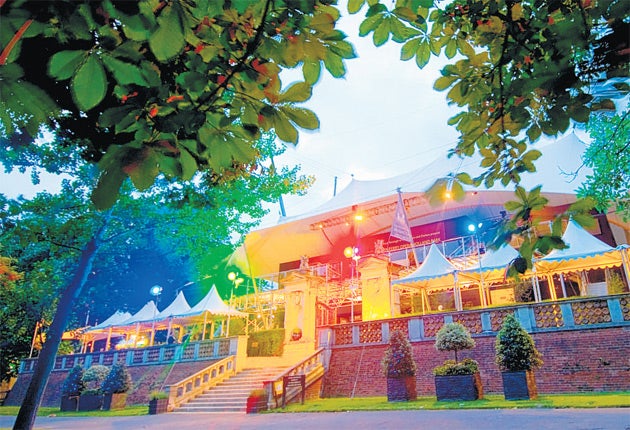The marriage of Figaro and footie
I'm working-class, tattooed and a football fan. I also run an opera venue. So don't call me elitist, says Michael Volpe

Your support helps us to tell the story
From reproductive rights to climate change to Big Tech, The Independent is on the ground when the story is developing. Whether it's investigating the financials of Elon Musk's pro-Trump PAC or producing our latest documentary, 'The A Word', which shines a light on the American women fighting for reproductive rights, we know how important it is to parse out the facts from the messaging.
At such a critical moment in US history, we need reporters on the ground. Your donation allows us to keep sending journalists to speak to both sides of the story.
The Independent is trusted by Americans across the entire political spectrum. And unlike many other quality news outlets, we choose not to lock Americans out of our reporting and analysis with paywalls. We believe quality journalism should be available to everyone, paid for by those who can afford it.
Your support makes all the difference.The terrace was full of them; shaven, muscular, large. Tattoos shouting their allegiance to Chelsea adorned their arms and there was a charge of emotion in the air. This group of 20 or so aggressive males stood out from the crowd. They had been witness to a conflict and I feared their reaction. As one trundled towards me I blanched at the force of his fulmination: "You've changed my effing life you have!" The terrace was at Opera Holland Park and La Traviata, not me, had changed his life.
Prompted by tenor Alfie Boe's endless droning about his working class background, the mindless one-dimensional caricature of opera has been occupying many in the press recently. Charles Moore thinks it is indeed elitist (lazy word of the year?) and should stay that way. Boe thinks it is peopled by fey upper class Oxbridge graduates who think his oily, spark-plugged background is beneath them. He wants to punch them all very hard.
Moore and Boe each prove the other's point but, as the Scots would say, "they're neither of them spoiling another couple". The reality is somewhere in the middle, which is where most of us who run opera houses and companies sit, often unheard, tarred with the same brush and pissed off. Very pissed off.
If we want to deal in clichés then I am sure my colleague, the brilliant producer James Clutton, and I could tick a few boxes; both of us are working-class Londoners who didn't go to Oxbridge. I come from a single-parent Italian-immigrant family whose loving mother threw ornaments and shoes at me when I misbehaved, we both go to football matches, swear like troopers, like to dress up in good suits, like jazz, the Beatles and soul music. To further clarify the impression, I can be frequently found bashing the granny out of punch bags at the gym and have... wait for it... tattoos; full-sleeve, vibrant Japanese tattoos (although one has to confess such body art is becoming rather middle-class these days). As far as I can tell, neither of us is fey. Despite all of this, we also happen to run an opera company that was named the best in the UK in 2010.
I see no reason why opera cannot become the preserve of the reformed hooligan, the bin-person, the builder. When we discuss whether or not opera excludes the "ordinary" folk, the most common reference is to Glyndebourne, Garsington and Grange Park, where black-tie, seats costing hundreds of pounds and champagne picnics are de rigueur. Obviously, those houses do what they do with serious musical intent and are undoubtedly grand social events. But that isn't opera. Opera itself – the art-form – is not elitist, is not intellectually high falutin' or inherently exclusive.
Naturally, as an expensive artistic entity, opera has historically received great wads of money and charged similarly great wads to be seen. In recent years, however, countless access programmes have emerged (even at the three Gs) that have provided wonderful opportunities for all.
Culturally, since our estate kids, working men's clubs or schools in the inner city don't generally get exposed to opera in anything like sufficient quantities, the patronage of the lyric arts has tended to emerge from the strata of society who did grow up in environments where this music was enjoyed and experienced. The scandal is that this should still be the case. And we all know that there is an enormous capacity for enjoying opera in this country; just look at the Three Tenors and anything else that is considered to be operatic (whether it is or not).
But just because Glyndebourne and the country-house circuit represent the pinnacle of operatic social bolt-on, we shouldn't allow the myth that they represent the entire opera world to continue.
Michael Volpe is General Manager at Opera Holland Park, London. The season features six operas, and runs until 13 August. Tickets £12-£63.50 (0300 999 1000; www.operahollandpark.com)
Join our commenting forum
Join thought-provoking conversations, follow other Independent readers and see their replies
Comments